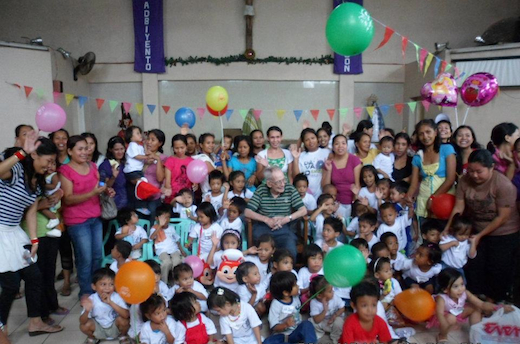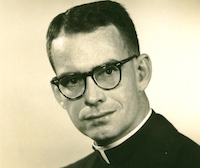This is Fr John J (Jack) Carroll’s 70th year as a Jesuit. At 89, he has spent most of his priesthood in the Philippines, where he was assigned just three years after entering the New York Province in 1943. The Philippines was then a mission of the New York Province. Fr Jack says, “I saw my life’s work here.” When he took his final vows in 1960, it was as a member of the Philippine Province.
In the Philippines, he has spent decades studying and speaking out on social issues in the country. In 1984, the Philippine Provincial, Fr Bienvenido F Nebres SJ, asked him to establish a think tank to help the anti-dictatorship opposition build a programme of government consistent with Catholic social principles. Fr Jack founded the Institute on Church and Social Issues and became it first Executive Director.
Looking back on his seven decades as Jesuit, Fr Jack says that “It’s been a great, if sometimes bumpy ride. As I look back on 70 years in the Society, on three continents, and recall the thousands of students, co-workers, and urban poor whom I have been privileged to know and serve and call my friends, I am amazed at the Lord’s generosity.”
Below is a commentary on Fr Jack Carroll, written by Eleanor R Dionisio, an associate director of the John J Carroll Institute on Church and Social Issues. It was first published in the Philippine Daily Inquirer.
Speaking truth to power, without screaming
Just for a change, people need to hear about a priest who isn’t screaming about contraception, divorce, and same-sex marriage.
That’s what I told Father Jack. It may have been the only reason he agreed to let me write this piece for his 70th anniversary as a Jesuit.
Father Jack doesn’t scream, not even about a “culture of death” more fatal to Filipinos than the condom: a society that engenders poverty, inequity, corruption, and the suppression of human rights. Of course, he’s angry about those issues. But he speaks about them deliberately, with the quiet authority of one who has done his homework. He has been doing his homework for a long time.
In 1943 John J Carroll, then 19, entered the New York Province of the Society of Jesus. In 1946 he was shipped off to its mission territory, the Philippines. Here he saw a people struggling to build their nation from the ashes of colonization and war on a volatile foundation of inequitable social structures—and to build their lives above the misery created by those structures.
A scientist at heart, Father Jack had wanted to be a biologist. But the Philippines had other needs to which he could apply his scientific mind.
After ordination in 1955 he was sent to do an MA in sociology at Fordham University in New York City, then a PhD in sociology and Southeast Asian studies at Cornell University in Ithaca, New York. Returning to the Philippines in the 1960s, he joined the Institute of Social Order, a Jesuit apostolate applying Catholic social teaching to the problems of poverty, inequity, and injustice in the Philippines. He remained immersed in those problems even as he served as a trustee of such respectable academic institutions as the Philippine Social Science Council and Ateneo de Manila University.
In the early 1970s Father Jack was research director of the National Secretariat for Social Action, the executive arm of the Episcopal Commission on Social Action of the Catholic Bishops’ Conference of the Philippines. There he sought to cultivate within the institutional structures of the Church a value for the light shed by the social sciences on the societal problems which she had just begun to confront.
In 1973, as the dictatorship of Ferdinand Marcos tightened its grip on the nation, Father Jack was posted to an academic career abroad. He taught at the Pontifical Gregorian University in Rome, becoming dean of its Faculty of Social Sciences from 1975 to 1981. In 1981 and 1982 he was a visiting professor at Cornell, running the Philippines seminar for its Southeast Asia Program.
But all those years he was also monitoring the dictatorship and participating in an as-yet-nebulous movement to undermine it. He wrote articles against the dictatorship under a pseudonym, Benjamin A. McCloskey, which combined his father’s given name, the initial of his mother’s given name, and his mother’s maiden name. The articles appeared in The Communicator, a Jesuit publication which the military later shut down.
In 1982 Father Jack returned to the Philippines to teach at Ateneo’s Department of Sociology and Anthropology, and to direct the university’s Institute of Philippine Culture. In 1984 the superior of the Philippine Province of the Society of Jesus, Fr. Bienvenido F. Nebres, SJ, asked him to set up a think tank to help the antidictatorship opposition build a program of government consistent with Catholic social principles. Father Jack cofounded the Institute on Church and Social Issues (Icsi) with Father Nebres and Bishop Francisco E. Claver, SJ.
One of Icsi’s early papers discussed scenarios for the transition from dictatorship. In those days before e-mail and Facebook, the paper was photocopied many times over. There is an anecdote, never confirmed, that when the Marcoses fled Malacañang in the wake of the first Edsa uprising in 1986, a copy was found in the first lady’s bedroom.
After the dictatorship fell, Father Jack helped, behind the scenes, to shape the CBCP’s magisterial literature. A few CBCP pastoral documents from the 1980s-90s bear his imprint. In 1991 he was a consultant for the Commission on Social Concerns of the Second Plenary Council of the Philippines, which resolved that the Catholic Church in the Philippines should become a “Church of the Poor.” He cowrote the council’s working paper on social concerns, one of the bases of its Conciliar Document.

At 89, Father Jack can no longer say Sunday Mass in Payatas. But he is still one of our institute’s most prolific writers, a keen observer of Philippine society and the Catholic Church, a mentor and adviser to the institute’s staff members, and an attentive father figure to his scholars. He continues to have the compassionate heart of a priest, moved with pity for those who are as “sheep without a shepherd,” and seeking to help them find pasture—without screaming at them.
Source: Philippine Daily Inquirer
To find out more about the John J Carroll Institute on Church and Social Issues, visit www.jjcicsi.org.







